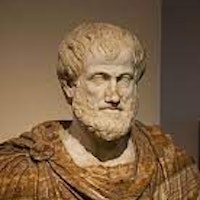The Virtues Spiritual Practice
Topic: Spiritual Growth & Practice
The virtues we acquire by first having actually practiced them, just as we do the arts. We learn an art or craft by doing the things that we shall have to do when we have learnt it: for instance, men become builders by building houses, harpists by playing on the harp. Similarly we become just by doing just acts, temperate by doing temperate acts, brave by doing brave acts.
Aristotle was a prominent Greek philosopher and polymath during the Classical period in Ancient Greece. Born in 384 BC in Stagira, a small town in northern Greece, he was the student of Plato and later became the tutor of Alexander the Great. Aristotle's works cover a wide range of topics, including logic, metaphysics, ethics, politics, rhetoric, poetry, biology, and zoology. His ideas have profoundly influenced Western thought and various branches of knowledge, such as philosophy, natural sciences, and political theory.
Aristotle's scientific and philosophical ideas were based on empiricism, the belief that knowledge is gained through sensory experience. He is credited with establishing the foundations of formal logic and the scientific method, concepts that have shaped the course of Western intellectual history. Aristotle’s ethical philosophy, especially his concept of virtue ethics, has been influential as well, introducing the idea of moral virtues as a middle path between extremes. Additionally, his work in political philosophy, particularly his assertion that 'man is a political animal,' has been foundational in political science.
In the Middle Ages, Aristotle's works were rediscovered by Islamic scholars and later transmitted to the West. This reintroduction played a significant role in the development of Scholasticism, a method of learning that dominated medieval universities. One of the most important figures in this period was St. Thomas Aquinas, a theologian and philosopher who integrated Aristotle's philosophy with Christian doctrine. Aquinas, often considered the greatest of the Scholastic philosophers, adopted and adapted Aristotle's ideas, particularly his views on metaphysics, ethics, and the nature of the soul, creating a synthesis that has shaped Catholic thought for centuries. This enduring influence testifies to Aristotle's profound impact on a wide range of academic disciplines and intellectual traditions.
Nicomachean Ethics
Wilson, Andrew, editor. World Scripture II. Universal Peace Federation, 2011, p. 569 [Aristotle, Nichomachean Ethics 2.1.4.].

Aristotle
Theme: Spiritual Growth


Aristotle, Nichomachean Ethics 2.1.4
This passage from Aristotle’s Nicomachean Ethics (Book II, Chapter 1, Section 4) is a foundational statement in his ethical theory. Aristotle is arguing that virtues are habits that we develop through repeated actions. This is a crucial aspect of his virtue ethics, which emphasizes the cultivation of good character traits (virtues) as the key to ethical behavior.
Let’s examine this passage more closely:
“The virtues we acquire by first having actually practiced them, just as we do the arts.”
Here, Aristotle draws an analogy between learning an art or craft and developing a virtue. Just as we become proficient in an art by practicing it, we become virtuous by practicing virtuous actions. This means that virtue is not something innate or given to us; it is something we must actively work on and cultivate. This statement also implies that anyone can become virtuous, as long as they are willing to practice and learn, just as anyone can learn a new art or craft.
“We learn an art or craft by doing the things that we shall have to do when we have learnt it: for instance, men become builders by building houses, harpists by playing on the harp.”
Here, Aristotle emphasizes his point by providing specific examples. A person becomes a builder by actually building, not merely by studying or contemplating building. Similarly, a person becomes a harpist by playing the harp, not just by learning about it. Aristotle is emphasizing the importance of practical engagement and experience in learning and self-development.
“Similarly we become just by doing just acts, temperate by doing temperate acts, brave by doing brave acts.”
In the final sentence, Aristotle applies the principle he’s established to moral virtues. Just as a builder becomes a builder by building, a person becomes just by doing just acts, temperate by doing temperate acts, and brave by doing brave acts. This suggests that our moral character is shaped by our actions. If we want to be virtuous, we must act virtuously.
This view is somewhat counterintuitive, as we often think of our actions as reflecting our character, rather than forming it. But for Aristotle, the relationship between action and character is reciprocal: our actions form our character, and our character in turn guides our future actions. This also implies a responsibility for our own moral development: if we want to be good, we must make a conscious effort to do good deeds.
In summary, this passage from the Nicomachean Ethics underlines the importance of practice and active engagement in the development of virtues according to Aristotle’s ethical theory. Virtues are not innate or given; they are developed and cultivated through our actions. This perspective places a significant emphasis on individual responsibility for moral development and the formative role of our actions in shaping our character.
Related Quotes
Copyright © 2017 – 2025 LuminaryQuotes.com About Us